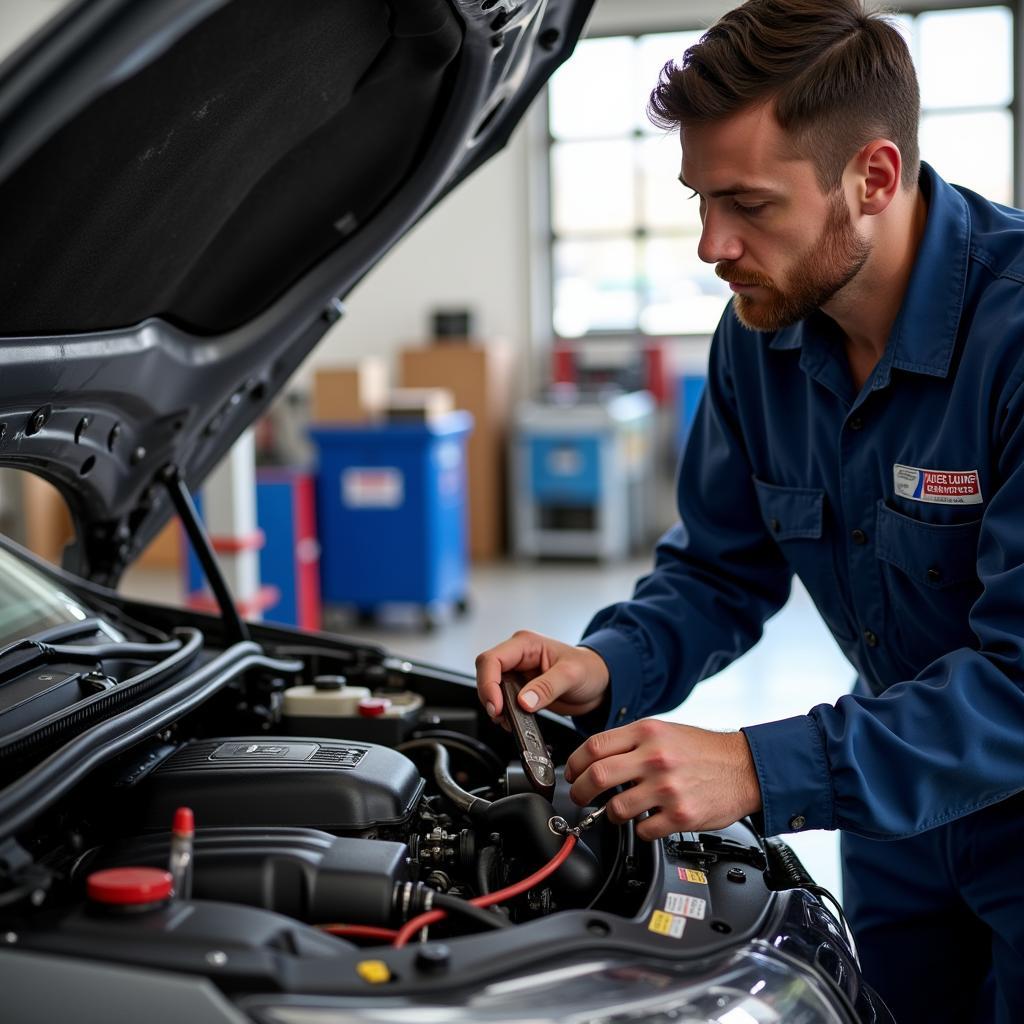Experiencing a hard start, especially in the morning, can be a frustrating way to begin your day. If your car is struggling to turn over after a night’s rest and you suspect a fuel problem, you’ve come to the right place. This article will delve into the common fuel-related issues that cause hard morning starts and guide you through troubleshooting and solutions.
Understanding Why Your Car Struggles to Start
A car requires a precise mixture of air and fuel to ignite and start. When this balance is disrupted, starting problems can occur. If the issue is fuel-related, it often means that the engine isn’t receiving enough fuel, or the fuel isn’t reaching the engine in the right condition. This is especially prevalent in the morning due to factors like temperature changes and fuel evaporation overnight.
Common Fuel-Related Causes of Hard Morning Starts
Several fuel system components can contribute to hard starting. Let’s break down the usual suspects:
Fuel Pump Issues
The fuel pump is responsible for delivering fuel from the tank to the engine. A failing fuel pump may struggle to provide adequate pressure, especially after sitting idle overnight, leading to a hard morning start. Listen for a whining noise from the fuel tank, which can indicate a failing pump.
Faulty Fuel Injectors
Fuel injectors spray fuel into the engine cylinders. Clogged or leaking injectors can disrupt the proper fuel-air mixture. A leaking injector can cause fuel to pool overnight, flooding the engine, while a clogged injector restricts fuel flow, making it difficult to start.
Fuel Pressure Regulator Malfunction
The fuel pressure regulator maintains consistent fuel pressure in the fuel system. A faulty regulator can cause either too much or too little fuel to reach the engine, leading to starting issues, particularly in the morning when the engine is cold.
Evaporative Emission Control System (EVAP) Problems
The EVAP system prevents fuel vapors from escaping the fuel tank. A leak in this system can cause fuel to evaporate overnight, resulting in a hard start the next morning. Look for a strong fuel smell around your car, which can indicate an EVAP leak.
Troubleshooting Your Fuel Problem Car
Here’s a step-by-step guide to help you pinpoint the cause of your fuel-related hard starting:
- Check the Fuel Pressure: Use a fuel pressure gauge to measure the fuel pressure at the fuel rail. Compare your readings with the manufacturer’s specifications.
- Inspect the Fuel Injectors: Visually inspect the injectors for leaks or damage. You can also have them professionally tested.
- Examine the Fuel Pressure Regulator: Check the regulator for leaks or damage. If possible, test the regulator’s vacuum line for proper operation.
- Inspect the EVAP System: Check for leaks in the EVAP system, including the hoses, charcoal canister, and fuel cap. A smoke test can be useful in detecting small leaks.
Getting Your Car Back on the Road
Once you’ve identified the culprit, address the problem accordingly. This may involve replacing the fuel pump, cleaning or replacing fuel injectors, replacing the fuel pressure regulator, or repairing leaks in the EVAP system.
“Regular fuel system maintenance, including fuel filter replacements and injector cleaning, can prevent many hard starting issues,” advises John Miller, a seasoned automotive technician with over 20 years of experience. “Don’t wait until your car struggles to start every morning. Preventive maintenance can save you time, money, and frustration.”
Conclusion
Hard starting in the morning can be a telltale sign of a fuel problem car. By understanding the common fuel-related causes and following the troubleshooting steps outlined above, you can diagnose and fix the issue effectively. Regular maintenance and timely repairs can keep your car running smoothly and prevent fuel problem car starts hard in the morning scenarios.
Need help diagnosing or fixing your hard starting problem? Contact us at AutoTipPro for expert assistance.
Phone: +1 (641) 206-8880
Office: 500 N St Mary’s St, San Antonio, TX 78205, United States
“Early detection of fuel system issues is crucial,” adds Sarah Chen, a leading automotive engineer. “Addressing these problems promptly can prevent further damage and ensure the longevity of your vehicle’s engine.” Don’t hesitate to seek professional help if you’re unsure about the diagnosis or repair.







Leave a Reply